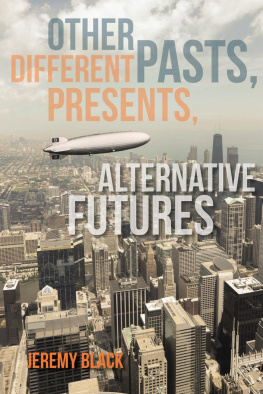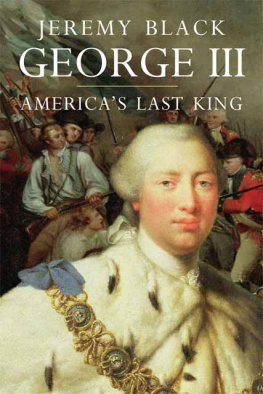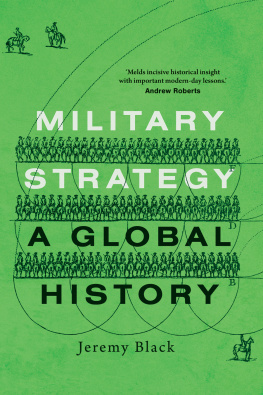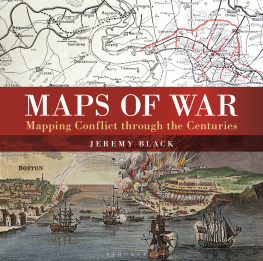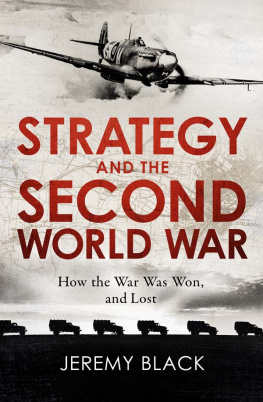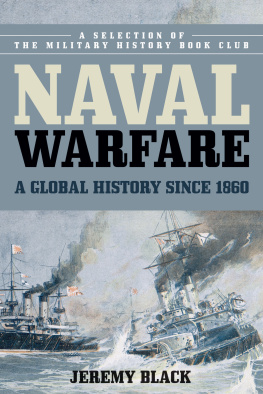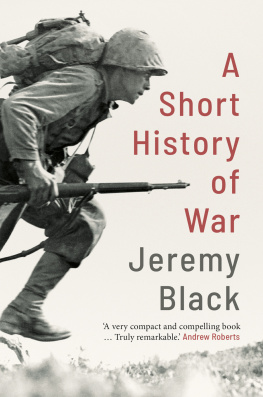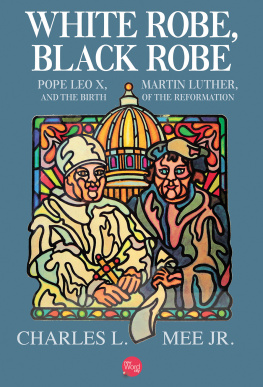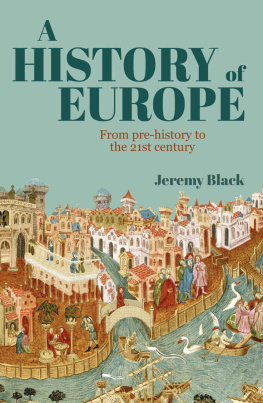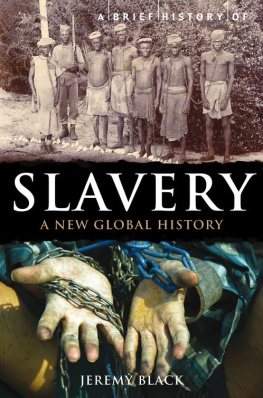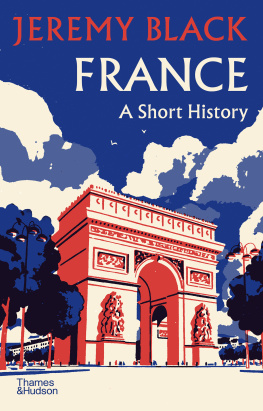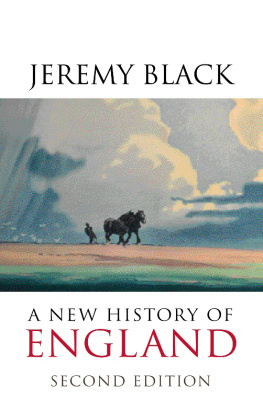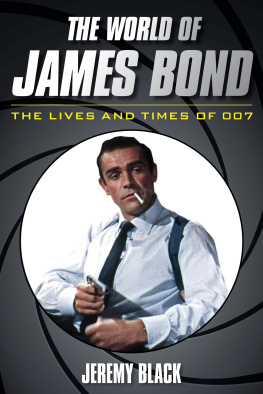This book is a publication of
Indiana University Press
Office of Scholarly Publishing
Herman B Wells Library 350
1320 East 10th Street
Bloomington, Indiana 47405 USA
Telephone800-842-6796
Fax812-855-7931
iupress.indiana.edu
2015 by Jeremy M. Black
All rights reserved
No part of this book may be reproduced or utilized in any form or by any means, electronic or mechanical, including photocopying and recording, or by any information storage and retrieval system, without permission in writing from the publisher. The Association of American University Presses Resolution on Permissions constitutes the only exception to this prohibition.
The paper used in this publication meets the minimum requirements of the American National Standard for Information SciencesPermanence of Paper for Printed Library Materials, ANSI Z39.48-1992.
Manufactured in the United States of America
Cataloging information is available from the Library of Congress
ISBN 978-0-253-01697-3 (cloth)
ISBN 978-0-253-01704-8 (paperback)
ISBN 978-0-253-01706-2 (ebook)
1 2 3 4 5 20 19 18 17 16 15
Preface
The 2010s are a decade of commemorative anniversaries, most of which invite questions about whether other outcomes were possible and, if so, what would have happened. What if there had been no World War I or no Russian Revolution?the latter incidentally an unlikely occurrence had there been no such war. What if Napoleon had won at Waterloo in 1815?; or if the Jacobites had won in 1715?; or if there had been no Bohemian Revolt leading to the outbreak of the Thirty Years War in 1618?; or if Martin Luther had not nailed his complaints to the church door at Wittenberg in 1517?; or if Henry V had not won at Agincourt in 1415?; or Robert the Bruce at Bannockburn in 1314? Or if King John had not been obliged to accept Magna Carta in 1215?
The list can be readily extended, as well as varied by country and theme. The common element is the questioning of apparent certainties, or known knowns, to quote Donald Rumsfeld. Indeed, What if? books today take a prominent role in airport bookshops, and have been a major publishing success over the last two decades.
Yet this approach, generally known as counterfactualism, has had only a limited impact in academic history and, more particularly, in historiography and the teaching of historical method. Indeed, there have been significant attacks on the counterfactual approach. This is unfortunate, as counterfactualism has much to offer. In this book, I offer a short guide to the subject, one that is designed to argue its value as a tool for public and academe alike. In particular, I focus on the role of counterfactualism in demonstrating the part of contingency, and thus human agency, in history, and on the critique the counterfactual approach necessarily offers to determinist accounts of past, present, and future, and therefore its value for teaching and research. I also discuss how counterfactualism can explain structural questions, notably how the modern world system took the form it did and does, and the form it might take in the future.
I have benefited first from the invitation to speak on this subject at a conference held at the Mershon Center at Ohio State University in 1997, and second from opportunities to offer counterfactual approaches to the American Revolution in lectures at Adelphi University, Assumption University, North Georgia University, the University of Washington, Rhode Island College, the University of Virginia Summer School, and the Lexington Historical Society. I also benefited from the opportunity to speak at the Fifth CECC International Conference on Culture and Conflict in Lisbon in 2013.
The comments of Pete Brown, Stan Carpenter, David Cohen, Strobe Driver, Bill Gibson, Stephen Morillo, Bill Purdue, Gavriel Rosenfeld, Richard Seaford, Dennis Showalter, Philip Woodfine, Neil York, and two anonymous readers on all or part of an earlier version proved most instructive. I also benefited from discussing the topic with Michael Axworthy, Jonathan Barry, Ian Beckett, Anthony Beevor, George Bernard, Richard Bernstein, John Blair, Rui Manuel Brs, Ahron Bregman, Michael Bregnsbo, Carl Bridge, Roger Burt, Stan Carpenter, James Chapman, Guy Chet, Jonathan Clark, Robert Cowley, Martin van Creveld, Michael DeNie, Kelly DeVries, Simon Dixon, Mike Dobson, David Ekserdjian, Warren von Eschenbach, Olavi Flt, Felipe Fernandez-Armesto, John France, Henry French, John Gaddis, David Gladstone, Jan Glete, Richard Hall, Richard Harding, Nick Henshall, Bob Higham, Michael Hochedlinger, Peter Hoffenberg, Jeff Horn, Tristram Hunt, Ronald Hutton, John Imber, Philippa Joseph, Henry Kamen, Janice Kaye, Tony Kelly, Brenda Laclair, John Lamphear, Karl de Leeuw, Jan Lemnitzer, Stephen Levine, Stewart Lone, Peter Lorge, Malcolm Mckinnon, John Maurer, Tim May, Rana Mitter, Anthony Musson, Ian Netton, Jeremy Noakes, William Olejniczak, James Onley, Mark Overton, Richard Overy, Marc-William Palen, Ryan Patterson, Mike Pavkovic, Murray Pittock, Arno Richter, Levi Roach, Andrew Roberts, Gijs Rommelse, Ralph Sawyer, Joe Smith, Christopher Storrs, Nigel Townson, Richard Toye, Frank Turner, Hans van de Ven, Hilde De Weerdt, Chris Wickham, Peter Wiseman, and Adam Zeman. None is responsible for any errors in the book nor do they necessarily share the opinions offered, but much of the fun of this book has stemmed from the chance to discuss the subject with friends far and wide. I also benefited greatly from a variety of roles in public history, not least in advising the UK Department of Education in 2013 on revisions to the National Curriculum.
An earlier, shorter study, What If? Counterfactualism and the Problem of History, was published by the Social Affairs Unit in 2008 and I would like to thank Michael Mosbacher for permission to use some of the material from that work. Bob Sloan has proved a most helpful editor for this book, and Eric Levy an exemplary copyeditor. It is a great pleasure to dedicate it to Ginny and Peter Knott, thoughtful friends with an interest in books.

